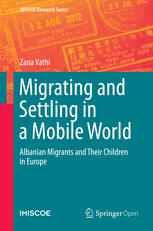

Most ebook files are in PDF format, so you can easily read them using various software such as Foxit Reader or directly on the Google Chrome browser.
Some ebook files are released by publishers in other formats such as .awz, .mobi, .epub, .fb2, etc. You may need to install specific software to read these formats on mobile/PC, such as Calibre.
Please read the tutorial at this link: https://ebookbell.com/faq
We offer FREE conversion to the popular formats you request; however, this may take some time. Therefore, right after payment, please email us, and we will try to provide the service as quickly as possible.
For some exceptional file formats or broken links (if any), please refrain from opening any disputes. Instead, email us first, and we will try to assist within a maximum of 6 hours.
EbookBell Team

0.0
0 reviewsThis book draws on award-winning cross-generational research comparing the complex and life-changing processes of settlement among Albanian migrants and their adolescent children in three European cities: London (UK), Thessaloniki (Greece), and Florence (Italy). Building on key concepts from the social sciences and migration studies, such as identity, integration and transnationalism, the author links these with emerging theoretical notions, such as mobility, translocality and cosmopolitanism. Ethnic identities, transnational ties and integration pathways of the youngsters and adults are compared, focusing on intergenerational transmission in particular and recognizing mobility as an inherent characteristic of contemporary lives.
Departing from the traditional focus on the adult children of settled migrants and the main immigration countries of continental North-Western Europe, this study centres on Southern Europe and Great Britain and a very recently settled immigrant group. The result is an illuminating early look at a second generation “in-the-making”. Indeed, the findings provide ample grounds for pragmatic and forward-looking policy to enable these migrant-origin youngsters, and others like them, to more fully attain their potential.
The book ends with a call to reassess the term “second generation” as it is currently used in policy and scholarly works. Children of migrants seldom see themselves as a particular and homogeneous group with ethnicity as an intrinsic identifying quality. More importantly, they make use of all the limited resources at their disposal, and view their integration processes through broader geographies – showing sometimes a cosmopolitan orientation, but also using localized reference points, such as the school, city, or urban neighbourhood.